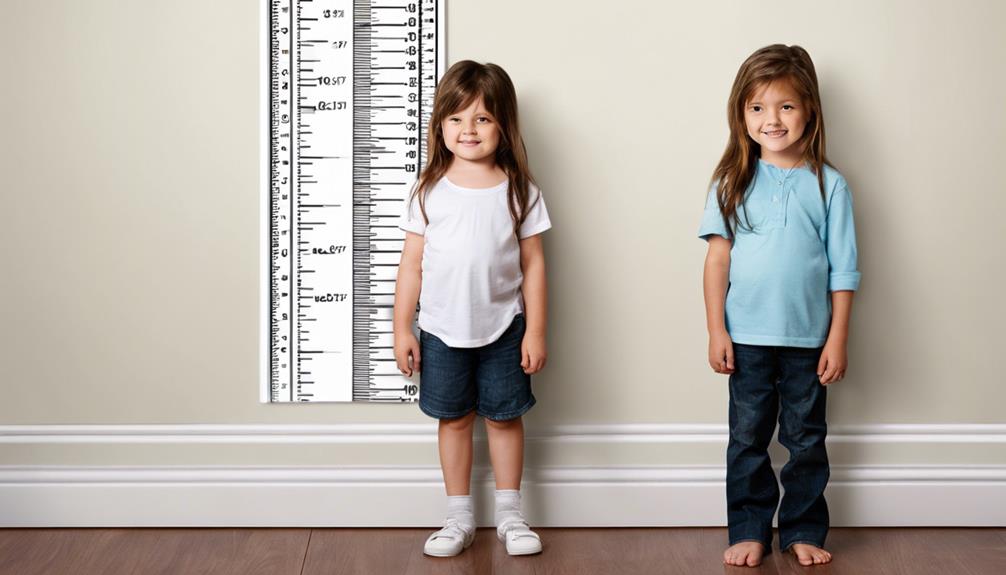You know the saying, 'Knowledge is power'? Well, when it comes to understanding child development, assessment is the key to revealing that power.
As we navigate the intricate landscape of evaluating children's growth and progress, it's essential to ponder the diverse methods and tools available.
But what sets apart a detailed guide on how child development is assessed? Stay tuned to discover the nuanced approaches, insightful strategies, and impactful outcomes that shape the assessment process and inform tailored interventions for each child's unique journey towards success.
Key Takeaways
- Screening tools and diagnostic assessments are essential for early identification of developmental issues.
- Formative evaluation helps tailor teaching to individual needs, while summative assessment evaluates overall progress.
- Assessments cover cognitive, social-emotional, and physical development to inform individualized education plans.
- Practical applications include using observations, portfolios, and tests to document growth and tailor learning opportunities.
Screening Tools in Child Development
When evaluating child development, utilizing screening tools is essential to promptly identify potential delays across cognitive, motor, speech, and social-emotional domains. These tools help us pinpoint early signs of potential developmental issues that children may be facing. By focusing on developmental milestones, screening tools allow us to catch concerns early on, enabling us to tailor interventions to meet each child's specific needs.
Social-emotional assessments within these tools explore emotional expression, relationships, and social interactions, providing a holistic view of a child's well-being. Moreover, mental health screenings play an important role in identifying children who may require additional support for mental health disorders.
Following these screenings, diagnostic assessments offer in-depth information on specific concerns, guiding us in developing targeted strategies to support children effectively. By recognizing and addressing potential developmental issues through these screening tools, we can better assist children in reaching their full potential and thriving in their developmental journey.
Diagnostic Assessments for Children

Utilizing standardized tools, diagnostic assessments for children offer a thorough evaluation of specific developmental concerns, such as intelligence, autism, and learning disabilities. These assessments extensively explore a child's cognitive, social-emotional, and physical development, providing important insights for intervention strategies. Administered by professionals like psychologists or special educators, diagnostic assessments comprehensively evaluate children's abilities and challenges.
The results obtained from these assessments are instrumental in crafting individualized education plans (IEPs) that cater to the unique needs of each child. Additionally, diagnostic assessments play a pivotal role in early identification, highlighting children who may benefit from additional support services or specialized interventions. This essential approach guarantees that children receive the necessary assistance promptly, fostering their holistic development.
- Thorough Evaluation: Diagnostic assessments cover intelligence, autism, and learning disabilities.
- Comprehensive Information: Assessments analyze cognitive, social-emotional, and physical development.
- Professionally Administered: Psychologists and special educators conduct the assessments.
- Tailored Interventions: Results inform the creation of individualized education plans (IEPs).
- Early Identification: Essential in identifying children needing support services or specialized interventions.
Formative Evaluation in Child Development

In exploring child development further, we shift our focus to formative evaluation, a dynamic process integral to understanding children's progress and adapting teaching strategies accordingly. Formative assessment involves ongoing assessments that play a vital role in monitoring progress, identifying areas of growth, and tailoring teaching to meet individual needs effectively.
Educators embed formative evaluation within daily activities to provide real-time feedback, allowing them to make instructional decisions based on evolving needs. By engaging in formative assessment, educators gain valuable insights into how children are learning, enabling them to adjust their approaches to support each child at their best. This approach fosters a deeper understanding of students' development and guarantees that teaching strategies are responsive and tailored to the unique requirements of each child.
Through formative evaluation, educators can create a supportive and adaptive learning environment that promotes continuous growth and development.
Summative Assessment for Children

Summative assessments in early childhood education offer a thorough evaluation of children's overall learning achievements at the culmination of a specific period, aligning their progress with established standards or benchmarks. These assessments serve as an important tool for educators to assess if children have met the learning goals and objectives set for a particular timeframe.
By providing a snapshot of children's progress across various developmental domains, summative assessments play a key role in informing future curriculum planning and instructional strategies. They're essential for ensuring accountability and determining school readiness, aiding educators in developing individualized learning plans to support each child's unique developmental journey.
- Summative assessments evaluate overall learning
- Provide insights into progress in developmental domains
- Aid in determining if learning goals have been met
- Important for informing curriculum planning and instructional strategies
- Assist in developing individualized learning plans
Practical Applications of Child Assessments

When conducting child assessments in early childhood education, various methods like observations, portfolios, educator and parent ratings, and standardized tests are utilized to gather thorough data on children's development. These assessments are important in providing insights into a child's progress and areas needing support within an early childhood program. By utilizing thorough assessment tools, educators can tailor learning opportunities to enhance a child's development effectively. Assessment records that document a child's growth in areas such as language, motor skills, cognition, and social-emotional skills are invaluable for planning curriculum and sharing progress with parents.
| Assessment System | Features |
|---|---|
| HighScope COR | Focuses on child-initiated learning and active participatory learning |
| Teaching Strategies GOLD | Provides ongoing observational assessment to track a child's progress |
| The Work Sampling System | Assesses children's skills in various domains through a developmental lens |
These structured approaches to child assessments aid educators in understanding individual children's needs, facilitating targeted interventions, and fostering collaborative relationships with parents to support each child's holistic development.
Frequently Asked Questions
What Is the Comprehensive Assessment of Child Development?
We assess child development holistically with a thorough tool. It evaluates cognitive, language, social-emotional, physical, and behavioral aspects. This helps us tailor support for each child's unique strengths and areas needing growth, fostering their best development.
What Are the Methods of Assessment in Child Development?
We assess child development through observations, portfolios, educator and parent ratings, and standardized tests. These methods provide valuable insights into cognitive, physical, language, social-emotional, and learning growth. They help tailor educational activities and support children effectively.
How Do You Evaluate Child Development?
We evaluate child development through observations, portfolios, ratings, tests, and screenings. Aligning assessments with goals, using diverse methods, and ongoing observations are crucial. Assessments help identify support needs, plan instruction, and foster collaboration between educators and parents.
What Is a Comprehensive Assessment?
We believe a thorough assessment explores into various child development domains, offering a holistic view of strengths and areas needing support. It guides personalized instruction, fosters collaboration, and helps identify children who may benefit from additional interventions.
Conclusion
To sum up, evaluating child development is like putting together a puzzle. Each screening tool, diagnostic evaluation, formative appraisal, and summative evaluation piece fits together to create an all-encompassing picture of a child's growth and needs.
By using these tools effectively, educators and parents can collaborate to provide individualized instruction and support for children, ensuring they reach their full potential. It's all about connecting the dots to see the bigger picture and make a positive impact on a child's development journey.









